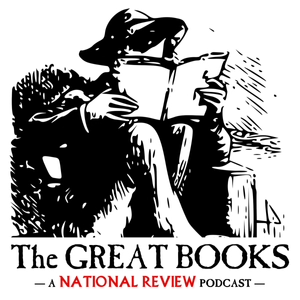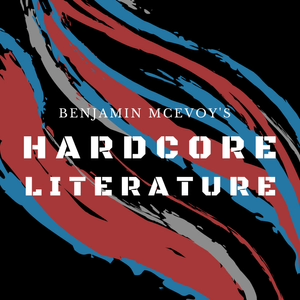
David Rohrbacher, "The Sources of the Historia Augusta Reexamined"
12/05/13 • -1 min
"Abstract: The first step toward unravelling the mysteries of the late Roman biographical collection called the Historia Augusta is to separate out the authentic historical material from the fictions which the author offers in abundance. This article presents a careful re- examination of the evidence for the sources of each section of the work, concluding that the author draws upon Enmann’s Kaisergeschichte and its progeny, Marius Maximus, Herodian, Dexippus, and, for the last Lives, a Greek source, perhaps Eunapius."
Link to Histos Table of Contents.
Link to the Article PDF.
Link to the Podcast. You can also find us on iTunes
"Abstract: The first step toward unravelling the mysteries of the late Roman biographical collection called the Historia Augusta is to separate out the authentic historical material from the fictions which the author offers in abundance. This article presents a careful re- examination of the evidence for the sources of each section of the work, concluding that the author draws upon Enmann’s Kaisergeschichte and its progeny, Marius Maximus, Herodian, Dexippus, and, for the last Lives, a Greek source, perhaps Eunapius."
Link to Histos Table of Contents.
Link to the Article PDF.
Link to the Podcast. You can also find us on iTunes
Previous Episode

Linda Jones Hall, "Clyde Pharr, the Women of Vanderbilt, and the Wyoming Judge: The Story Behind the Translation of the Theodosian Code in Mid-Century America" RLT 8 (2012), 1-42.
Few who work with the Theodosian Code are unfamiliar with Clyde Pharr's (Vanderbilt University) massive 1952 translation (Princeton University Press) of the legal work. Prof. Linda Jones Hall writes eloquently about the women--in particular Dr. Theresa Davidson--who contributed to the translation of the Theodosian Code, and the personal feuds and gender politics that may have contributed to their marginalization. This article also considers the contribution of Wyoming judge Fred H. Blume. The article illustrates that while female classicists were hard at work in mid-century America, they were not always given their due. It also demonstrates that, largely in the name of pomp, circumstance, and the name-dropping of well-known scholars, women and men of lesser academic renown were sometimes overlooked and unmentioned, though their work was of a high caliber.
A link to the pdf of the article here:
Linda Jones Hall, "Clyde Pharr, the Women of Vanderbilt, and the Wyoming Judge: The Story Behind the Translation of the Theodosian Code in Mid-Century America," Roman Legal Tradition 8 (2012), 1-42.
Journal Site: http://romanlegaltradition.org/contents/2012/
Podcast Feed : http://feeds.feedburner.com/AncientStudiesArticles
Next Episode

Elton Barker, et al. "Mapping an ancient historian in a digital age: the Herodotus Encoded Space-Text-Image Archive (HESTIA)"
This podcast ventures into the exciting realm of digital humanities by taking a look at the aims and methods of the HESTIA Project! We will read Elton Barker (Principal Investigator), Stefan Bouzarovski (Co-Investigator), Chris Pelling (Co-Investigator) and Leif Isaksen (ICT Consultant)'s 2010 article, "Mapping an ancient historian in a digital age: the Herodotus Encoded Space-Text-Image Archive (HESTIA)."
ABSTRACT: "HESTIA (the Herodotus Encoded Space-Text-Imaging Archive) employs the latest digital technology to develop an innovative methodology to the study of spatial data in Herodotus’ Histories. Using a digital text of Herodotus, freely available from the Perseus on-line library, to capture all the place-names mentioned in the narrative, we construct a database to house that information and represent it in a series of mapping applications, such as GIS,
GoogleEarth and GoogleMap Timeline. As a collaboration of academics from the disciplines of Classics, Geography, and Archaeological Computing, HESTIA has the twin aim of investigating the ways geography is represented in the Histories and of bringing Herodotus’ world into people’s homes."
The Article Itself.
Link to the Leeds International Classical Studies Journal
Podcast Link.
Links to Some Other Projects Mentioned in the Article:
1. Perseus Project
2. PostgreSQL
3. PostGIS
4. TimeMap
5. Nick Rabinowitz's Blog
If you like this episode you’ll love
Episode Comments
Generate a badge
Get a badge for your website that links back to this episode
<a href="https://goodpods.com/podcasts/ancient-studies-articles-166729/david-rohrbacher-the-sources-of-the-historia-augusta-reexamined-9048676"> <img src="https://storage.googleapis.com/goodpods-images-bucket/badges/generic-badge-1.svg" alt="listen to david rohrbacher, "the sources of the historia augusta reexamined" on goodpods" style="width: 225px" /> </a>
Copy




